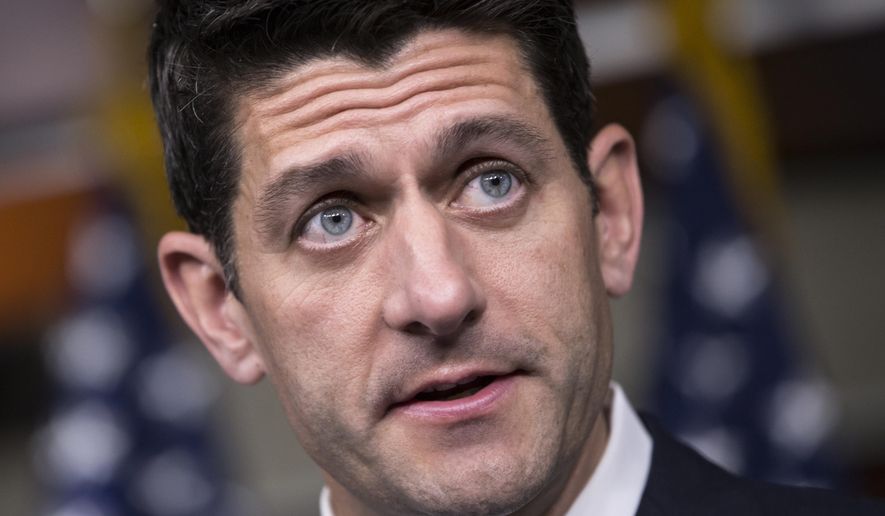House Speaker Paul D. Ryan announced Thursday that he will vote for presumptive presidential nominee Donald Trump, in another sign Republicans are coalescing behind their party’s standard-bearer ahead of the fall election.
Mr. Ryan, who publicly wrestled for the past month over whether to support Mr. Trump, said in an article published in his hometown newspaper that while the two have their differences, he is confident that the billionaire businessman would help House Republican priorities become law.
“That’s why I’ll be voting for him this fall,” Mr. Ryan, Wisconsin Republican, wrote in an op-ed for the (Janesville) Gazette.
Mr. Ryan had been the highest-ranking Republican official to withhold his support for the presumptive nominee, saying Mr. Trump needed to do more to prove he is conservative enough to helm the party. He also wanted to make sure Mr. Trump wouldn’t ruin House Republicans’ election-year agenda, which they will roll out over the next six weeks.
Despite having publicly rebuked Mr. Trump on several occasions, including over the real estate mogul’s proposal to temporarily ban Muslims from entering the United States, Mr. Ryan said Mr. Trump is the best option.
“It’s no secret that he and I have our differences. I won’t pretend otherwise,” the speaker wrote. “And when I feel the need to, I’ll continue to speak my mind. But the reality is, on the issues that make up our agenda, we have more common ground than disagreement.”
Mr. Trump welcomed the support in a Twitter message Thursday.
“So great to have the endorsement and support of Paul Ryan. We will both be working very hard to Make America Great Again!” he tweeted.
The two men’s disagreements run deep. Mr. Ryan helped lay the legislative groundwork for President Obama’s Pacific trade deal, which Mr. Trump has criticized. Mr. Ryan has long been committed to legalizing illegal immigrants, while Mr. Trump has staked his campaign on a pledge to deport them.
On May 5 — one day after Mr. Trump’s last Republican rival dropped out of the race — Mr. Ryan said on CNN that he wasn’t ready to support Mr. Trump’s candidacy. Mr. Trump shot back by saying he wasn’t ready to support Mr. Ryan’s agenda.
But the two have met in person and spoken over the phone since then, and have reported consistent progress on coming together.
Mr. Ryan repeatedly said that he wanted to see “real” party unity. He said the Republican Party can’t go into the fall election against likely Democratic nominee Hillary Clinton at half strength.
Richard E. Vatz, a professor at Towson University in Maryland who specializes in political rhetoric and persuasion, said Mr. Ryan hit all the right notes.
“The waiting and support of Trump do not seem like empty dramaturgy but seem to have yielded an honest coming-together on issues such as taxes, Obamacare, foreign policy and other issues critical to Republicans,” Mr. Vatz said. “Ryan has pitched perfectly and honestly with his strong but not resounding support of Trump. Anything more would seem dishonest; anything less would damn with faint praise.”
“The GOP will have to work to find a new majority in the Electoral College — Ryan’s support is a step forward,” he said.
The House speaker’s support is complicated, though, by his close relationship with 2012 Republican nominee Mitt Romney, who made Mr. Ryan his running mate and now is a leading figure in the #NeverTrump movement.
Brian Fraley, a Republican Party strategist in Wisconsin and a #NeverTrump adherent, said the move was inevitable but he thinks Mr. Ryan is still holding back. He noted that the speaker avoided the word “endorse” in the article.
“Look at how he did this too. Did he come down the escalator [at Trump Tower] arm in arm with Trump? No,” said Mr. Fraley. “He emailed a column to a local newspaper. This was the bare minimum he could do.”
But the announcement is a clear signal that Mr. Ryan wants a united Republican Party heading into the national convention in July.
Mr. Ryan said in his article that Mrs. Clinton would be a worse option in the White House than Mr. Trump when it comes to Republican priorities such as a tax code overhaul and repealing Obamacare.
“To enact these ideas, we need a Republican president willing to sign them into law,” Mr. Ryan wrote. “That’s why, when he sealed the nomination, I could not offer my support for Donald Trump before discussing policies and basic principles.”
News of Mr. Ryan’s support broke as Mrs. Clinton was lambasting Mr. Trump in a highly touted speech on foreign policy. She said making Mr. Trump the nation’s commander in chief would be a “historic mistake.”
Days earlier, the Libertarian Party nominated two former Republican governors of blue states, Gary Johnson of New Mexico and Bill Weld of Massachusetts, for president and vice president, respectively — creating what some are touting as the party’s strongest ticket ever.
Talk also has been swirling in recent days about conservative writer David French launching an independent presidential run as an alternative to Mr. Trump. William Kristol, editor of The Weekly Standard, has been fanning the speculation.
Rep. Debbie Wasserman Schultz of Florida, who chairs the Democratic National Committee, said Mr. Ryan backed away from his own criticisms of Mr. Trump’s campaign and “kissed the ring.”
“The failed Romney-Ryan presidential ticket in 2012 was the catalyst for a GOP autopsy report that said Republican leaders should move the party in a new direction,” she said. “Trump has soaked that report in gasoline and Paul Ryan just lit the match that’s about to turn it to ashes.”
• S.A. Miller can be reached at smiller@washingtontimes.com.
• David Sherfinski can be reached at dsherfinski@washingtontimes.com.




Please read our comment policy before commenting.